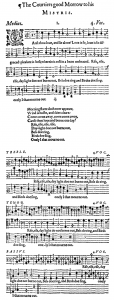Madrigals survey
As a little break from my coding horrors earlier today, I took a break this afternoon to study some madrigals. I would like to compare the Italian love madrigals with the English ones, and need to read through a whole load of them. I have made a good beginning, and so far seem to like the English ones much more.
The problem with Italian madrigals as far as I can tell is that their poets are so unsound. Petrach was a total rogue, and set a terrible beginning for all the others to follow. Almost all of his sonnets are absolutely terrible, in that they extol the pursuit of unrequited love. The person he was mad over, Laura, met him at a church service and said, 'I'm married; get lost'. For the next decades, he spent his life devoted to her totally against her instructions, and carried on pining for her once she was dead. If a suitably firm 'no' is given, and it is clear that there is no hope of getting the girl, either never or with no timeframe or reason to expect a change of heart, it is simply out of order to behave at all like Petrach, either letting the mind or pen or tongue pursue hopes and affections which have not been permitted. Contra the Italians, it is not right to dream of Rosalind and let love have its way if no permission is granted, because it must be as much up to the woman how you think of her as it is what you do with her.
So, I only really know Monteverdi's madrigals, and should reserve judgement on Italians in general, but Petrach's attitude does seem to poison their music quite a lot.
On the other hand, English songs seem so far to be rather more honourable. The majority of them deal with interactions between actual lovers for a start, where both parties are initially consenting. There are some where I feel I ought to disagree with the poet, but they are tender enough to have sympathy for the poet. See this one by Thomas Bateson:
Ah, Cupid grant that I may never see her through mine ear that thus hath wounded me, if through mine eyes another wound she give, Cupid, alas, then I no longer live, but die, poor wretch, shot through and through the liver, with those sharp arrows she stole from my quiver.
Though I have limited time and ability to comment on the music, I have to add that the tune to this one is particularly interesting.
The Italian madrigals may be fantastically witty, but my Italian is not good enough to tell. I suspect most are not as fine though as the Elizabethan taste for puns grew. I rather like the reserve and sweetness of this poor character in a setting by John Wilby, with its wry turn at the end, even if I have to somewhat disapprove of his approach (though in fairness, she does not seem to have been behaving as a gentle evangelical would):
Alas what hope of speeding Where hope beguiled lies bleeding? She bade come when she spied me, And when I came she flied me. Thus when I was beguiled, She at my sighing smiled. But if you take such pleasure Of hope and joy my treasure, By deceit to bereave me, Love me, and so deceive me.
Having said that, there are plenty of outrageous songs too, but without quite having the same continental abandon I find them less bothersome. There is a strong tendency to melancholy though which I admire because of the way it is kept in check. See this other one by Thomas Bateson:
If love be blind, how hath he then the sight, With beauty's beams my careless heart to wound? Or if a boy, how hath he then the might, The mightiest conquerors to bring to ground? Oh, he is not blind, but I that lead my thoughts the ways that bring to restless fears; nor yet a boy, but I that live in dread Mixed with hope, and seek for joy in tears.
The verse is ambiguous enough that it could very easily be honourable, and I find the metaphors lovely. Unfortunately Bateson is better with poetry than music here.
So far, I have made good inroads on the stuff on CPDL and Brian Russell's site, and will keep investigating over the summer. I cannot help finishing with one of my favourite writers Ravenscroft:
